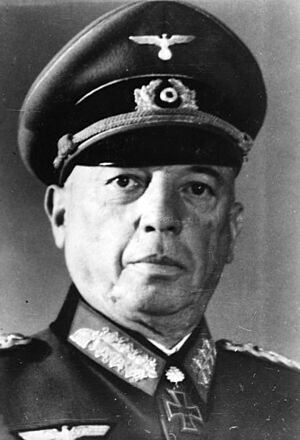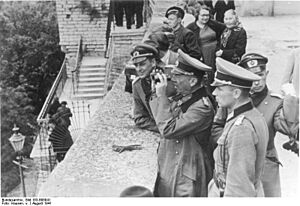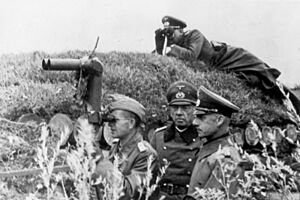Georg von Küchler facts for kids
Quick facts for kids
Georg von Küchler
|
|
|---|---|

Küchler in 1943
|
|
| Birth name | Georg Carl Wilhelm Friedrich von Küchler |
| Born | 30 May 1881 Philippsruhe Manor, Hanau, Kreis Hanau, Hesse-Nassau, Kingdom of Prussia, German Empire |
| Died | 25 May 1968 (aged 86) Garmisch-Partenkirchen, Landkreis Garmisch-Partenkirchen, Upper Bavaria, Bavaria, West Germany |
| Allegiance | |
| Years of service | 1900 – 1944 |
| Rank | Generalfeldmarschall |
| Commands held |
|
| Battles/wars | World War I
|
| Awards | See awards |
| Signature | |
Georg Carl Wilhelm Friedrich von Küchler (born May 30, 1881 – died May 25, 1968) was a high-ranking German military leader, known as a Field Marshal, during World War II. He led the 18th Army and Army Group North during the war on the Eastern Front.
After the war, he was put on trial for his actions during the conflict. He was found guilty of serious offenses and was sentenced to prison. He was later released in 1953.
Contents
Early Life and Military Career
Georg von Küchler was born on May 30, 1881, at Schloss Philippsruhe in Germany. His family had a long history in Prussia. In 1900, he joined the Imperial Army as a young officer cadet, specializing in artillery.
He quickly moved up the ranks, becoming a second lieutenant in 1901 and a first lieutenant in 1910. He also studied at the Prussian Military Academy, a top military school. After graduating in 1913, he joined the main military staff in Berlin.
World War I Service
When World War I began, Küchler was sent to the Western Front. As a captain, he commanded an artillery unit. He took part in major battles like the Somme and Verdun. For his bravery, he received the Iron Cross medal.
Later in the war, he worked in staff roles, helping to plan military operations. After the war ended, he joined a group called the Freikorps and fought against the Red Army in Poland.
Between the World Wars
After World War I, Küchler continued his military career in the new German army, the Reichswehr. He served in various positions, including commanding an artillery battery. He was promoted to major in 1924 and later became a colonel in 1931.
By 1934, he was a major general and commanded the 1st Infantry Division. The next year, he became a lieutenant general and was put in charge of army schools. In 1938, he became a general of artillery and commanded the 1st Military District, which was a challenging area near Poland. His troops marched into the city of Memel (now Klaipėda) in 1939.
World War II Campaigns
Invasion of Poland
When World War II started, Küchler's command became the German 3rd Army. He led several divisions, including a tank division, during the invasion of Poland. His forces captured the city of Danzig and advanced towards Warsaw.
Küchler's troops linked up with Soviet forces after defeating Polish units. After the Polish campaign, he was put in charge of the Army Frontier Command North. It is noted that Küchler refused to allow his soldiers to harm Polish civilians, stating that the army was not a "killer gang." This led to his removal from that command. In November 1939, he was given command of the 18th Army, which was being prepared for operations against the Netherlands.
Invasion of the Netherlands
On May 10, 1940, Germany began its invasion of the Low Countries and France. Küchler, leading the 18th Army, fought under General Fedor von Bock. His forces defeated the Dutch army in several key areas, including Moerdijk, Rotterdam, and The Hague.
After four days of fighting, the Dutch army surrendered on May 14. Küchler met with the Dutch military leaders and officially accepted their surrender. His troops then moved into Belgium and occupied Antwerp.
Eastern Front Operations
Küchler supported the war against the Soviet Union. He believed it was necessary for Germany's future. During Operation Barbarossa, the German invasion of the Soviet Union, his 18th Army advanced quickly. They captured cities like Ostrov and Pskov.
His army reached Narva and Kingisepp, then continued towards Leningrad. They helped create a siege around Leningrad, cutting off the city from many directions.
In January 1942, Küchler took over command of Army Group North from Field Marshal Wilhelm Ritter von Leeb. He maintained the difficult siege of Leningrad for a long time. On June 30, 1942, Hitler promoted Küchler to Generalfeldmarschall, the highest military rank.
In January 1944, Küchler was removed from his command and replaced by another general. He then retired from military service. He was asked to join a group that opposed Hitler, but he declined.
Trial and Later Life
After World War II ended, American forces arrested Küchler. He was put on trial as part of the Subsequent Nuremberg trials, which looked into the actions of high-ranking German military leaders.
On October 27, 1948, Küchler was found guilty of serious offenses committed during the war in the Soviet Union. He was sentenced to twenty years in prison. His sentence was later reduced to 12 years in 1951. He was released from prison in February 1953. Georg von Küchler lived with his wife in the Garmisch region of Germany until his death on May 25, 1968.
Awards
- Iron Cross (1914) 2nd Class (November 20, 1914) & 1st Class (January 8, 1915)
- Clasp to the Iron Cross (1939) 2nd Class (September 11, 1939) & 1st Class (September 22, 1939)
- Knight's Cross of the Iron Cross with Oak Leaves
- Knight's Cross on September 30, 1939, as General der Artillerie and commander of the 3rd Army
- 273rd Oak Leaves on August 21, 1943, as Generalfeldmarschall and commander of Army Group North
Images for kids
See also
 In Spanish: Georg von Küchler para niños
In Spanish: Georg von Küchler para niños




